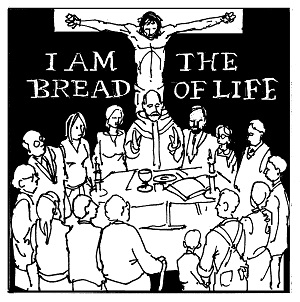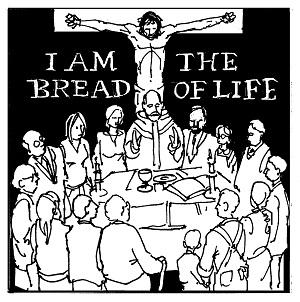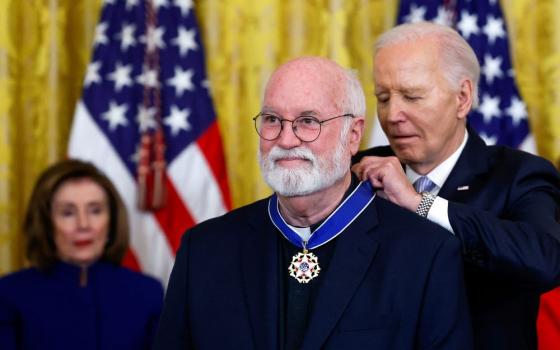

“I am the bread of life” (John 6:35).
Exod 16:2-4, 12-15; Ps 78; Eph 4, 17, 20-24; John 6:24-35
Eighteenth Sunday in Ordinary Time
The Lectionary devotes five consecutive Sundays to John 6 to remind us of the centrality of the Eucharist to the life and mystery of the church and as the source of our own personal faith lives. The Eucharist is the linchpin of all Christology centered on the Incarnation. Jesus did not leave his disciples a set of ideas, but instead a living sign that God is now immersed in the flesh and blood of creation and human destiny. We go to God as bodies incorporated by baptism into the crucified and risen body of Christ. The Eucharist transforms us as that body in the world and as active participants in its redemption.
The original worshiping church found in the Hebrew Scriptures the many themes that converge in the Gospels that proclaim Jesus as the bread of life: the unleavened bread of Passover, the blood on the lintels, the manna in the desert, the promise of a banquet in the Promised Land at the end of the long desert sojourn. The “breaking of the bread” became the memorial of Jesus’ sacrificial death, the meal that nourishes and sustains the People of God on their way to the Beloved Community. Without the Eucharist we lose our identity and scatter into ideological camps, lose touch with Jesus and one another and the sacred center and pledge of future glory that is eternal life. Without Communion we starve to death.
It is no surprise that threatened schism begins with quarreling over the meaning of the Eucharist. Is it a reward for the worthy or food for sinners? Is it a sacred object only the ordained can call down from heaven to be adored by the chosen few, or is it Jesus present as host and meal at the open table of the church where all are welcomed, fed and sent forth to complete its redemptive purpose in the world?
In today’s first reading from Exodus, the people God had rescued from slavery grumbled and begged Moses to take them back to Egypt where they had their fill at fleshpots and with bread. Moses calls down quail and manna in the desert to sustain them toward freedom. The Gospel writers saw in this gift of bread and meat from heaven a foretelling of Jesus’ miracles of multiplication in the wilderness. But physical food was only a sign of his offer to sacrifice his own flesh and blood to invite them into intimate union with the new Creation and eternal life made possible by the Incarnation. He was the bread from heaven that reconciled them to God and transformed them as God’s own children.
Paul’s theology of the Eucharist reflected in Ephesians recognized that the world also offers fleshpots and bread to satisfy human hunger for a while, but only by replacing the leaven of this world with the leaven of sincerity and truth can we find transformation and eternal life. Jesus is the Bread of Life and the Cup of Salvation. Only by uniting ourselves with him in his death can we experience his risen life in this world as the pledge of future glory. John’s Gospel proclaims the promise Jesus made at the heart of the Eucharist: “I am the bread of life; whoever comes to me will never hunger, and whoever believes in me will never thirst.”
Covid created a universal fast from receiving the Eucharist in person and in community. Now, as many once active parishes wonder if members will return, we must decide if being virtual Christians is enough or if we have rediscovered our hunger to bring our own “real presence” to the body of Christ in community. “Come to the Table,” the Scriptures invite us. Jesus is real food and real drink, and our very lives depend on receiving him as active members of his body, the Church.
Advertisement











